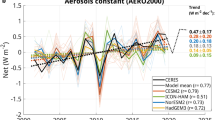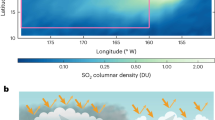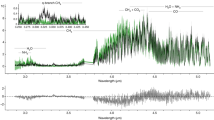Abstract
The Stony Brook ground-based remote sensing mm-wave spectrometer was used to measure chlorine monoxide in the stratosphere over McMurdo Station, Antarctica during the austral spring of 1986. From the data collected, we find strong evidence for abnormally high concentrations of CIO at low altitudes—as much as two orders of magnitude greater than standard theories predict at 20-km altitude at mid-latitudes. This low-altitude CIO changes cyclically on a diurnal basis, and also secularly during the September–October observing period. A study of the diurnal variation of the low-altitude ClO is presented here. We conclude that chlorine is crucially involved in the springtime destruction of Antarctic ozone.
This is a preview of subscription content, access via your institution
Access options
Subscribe to this journal
Receive 51 print issues and online access
$199.00 per year
only $3.90 per issue
Buy this article
- Purchase on Springer Link
- Instant access to full article PDF
Prices may be subject to local taxes which are calculated during checkout
Similar content being viewed by others
Author information
Authors and Affiliations
Rights and permissions
About this article
Cite this article
de Zafra, R., Jaramillo, M., Parrish, A. et al. High concentrations of chlorine monoxide at low altitudes in the Antarctic spring stratosphere: diurnal variation. Nature 328, 408–411 (1987). https://doi.org/10.1038/328408a0
Received:
Accepted:
Issue Date:
DOI: https://doi.org/10.1038/328408a0
This article is cited by
-
The discovery of the Antarctic ozone hole
Nature (2019)
-
Terahertz band simulations using two different radiative transfer models
Science China Earth Sciences (2018)
-
Ground-based millimeter-wave observations of ozone in the upper stratosphere and mesosphere over Tsukuba
Earth, Planets and Space (2014)
Comments
By submitting a comment you agree to abide by our Terms and Community Guidelines. If you find something abusive or that does not comply with our terms or guidelines please flag it as inappropriate.



